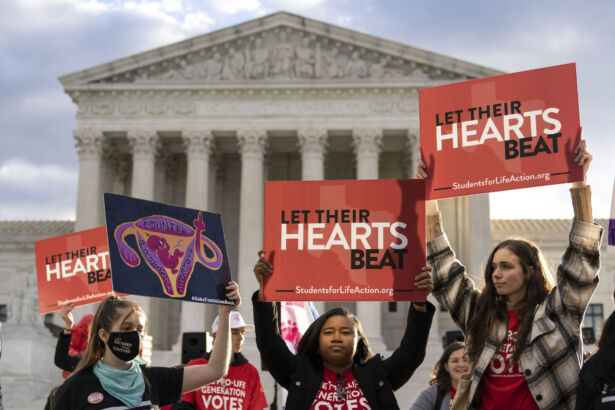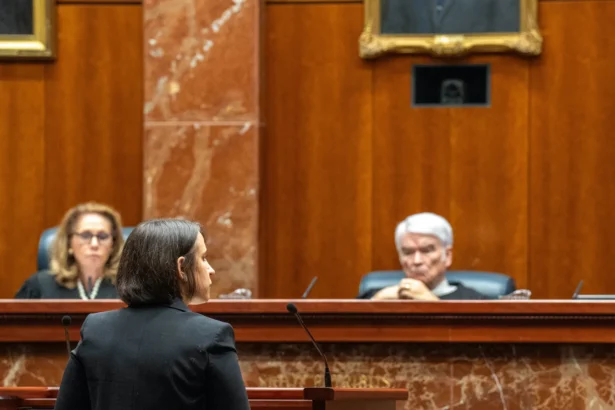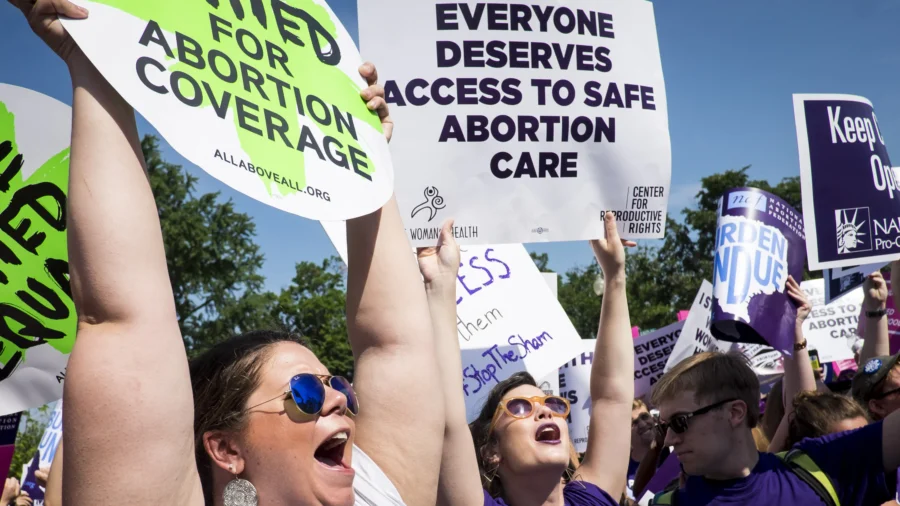A Texas judge has granted a pregnant woman’s request for a court-authorized abortion after her unborn child was diagnosed with multiple abnormalities and given no hope of survival after birth, with the decision coming despite strict prohibitions on the procedure in the state for any reason other than if the mother’s life is in danger.
A judge at the District Court of Travis County, Texas, granted a temporary restraining order on Dec. 7 to Kate Cox, a woman who is 20 weeks pregnant and filed an emergency lawsuit against the state of Texas.
Ms. Cox was seeking the right to abort her baby after doctors diagnosed it with Trisomy 18—a condition that causes multiple structural abnormalities—and gave it no chance of survival after birth.
Several doctors also told Ms. Cox that continuing to carry the pregnancy to term could threaten her health and future fertility, according to the Center for Reproductive Rights, which filed a lawsuit on her behalf on Dec. 5, asking the judge to impose a temporary restraining order—and a permanent injunction—against Texas’ strict abortion laws.
Texas’ abortion laws prohibit and criminalize abortions in all cases except when the mother’s life is in danger under a “medical emergency” exception.
Lawyers for the State of Texas argued in court that Ms. Cox’s symptoms did not meet the standard set out for a “medical emergency” and that her doctors made a “subjective” determination that she qualified for an abortion rather than basing their medical opinion on “objective” standards set out in law.
The Decision
In her complaint, Ms. Cox’s attorneys argued that the state’s abortion laws were causing “irreparable injury” to her and the other two plaintiffs—her husband and her doctor.
Because Ms. Cox had two prior cesarean surgeries (C-sections), continuing the pregnancy put her at high risk for severe complications threatening her life and future fertility, including hysterectomy and uterine rupture, her lawyers said. They argued that an abortion was the safest option for Ms. Cox’s health and her “best medical option given that she wants to have more children in the future.”
“Yet because of Texas’ abortion bans, Ms. Cox’s physicians have informed her that their ‘hands are tied’ and she will have to wait until her baby dies inside her or carry the pregnancy to term, at which point she will be forced to have a third C-section, only to watch her baby suffer until death,” they wrote, adding that Ms. Cox “needs an abortion, and she needs it now.”
During an emergency hearing on Thursday, the judge, Maya Guerra Gamble, agreed and granted Ms. Cox the temporary restraining order that allows her to get the abortion in Texas.
“The idea that Ms. Cox wants so desperately to be a parent and this law may have her lose that ability is shocking and would be a genuine miscarriage of justice,” Judge Gamble said from the bench. “So I will be signing the order and it will be processed and sent out today.”
The judge also scheduled a Dec. 20, 2024, date for a hearing on Ms. Cox’s request for a permanent injunction against Texas’ abortion laws.
The case is significant as it’s among the first attempts in the country to get a court-authorized abortion after the Roe v. Wade ruling, which gave states the right to impose their own abortion laws.
The Reactions
In a statement following the ruling, Ms. Cox said she needs to “end my pregnancy now so that I have the best chance for my health and a future pregnancy,” adding that she does not want her baby “to arrive in this world only to watch her suffer.”
Dr. Grazie Pozo Christie, a senior fellow at The Catholic Association and host of the radio show Conversations With Consequences, addressed the circumstances of the case in a video post on X, arguing that there are alternatives to abortion for babies diagnosed with Trisomy 18.
“There is such a thing as perinatal hospice, and that is where babies who are destined to die quickly, like babies with Trisomy 18, it’s true that the baby—that’s not compatible with life,” Dr. Christie said.
“Those babies are received by their mothers, by their fathers, by their family, in places of dignity and tenderness, and then they are loved and held and honored until that beautiful life passes through natural means.”

The judge’s decision to grant a temporary restraining order against the enforcement of Texas’ abortion laws only applies to Ms. Cox’s case, with her request for a permanent injunction pending further court proceedings.
Texas Attorney General Ken Paxton responded to the temporary restraining order, saying that it will not insulate hospitals, doctors, or anyone else from civil and criminal liability for violating Texas’ abortion laws.
Nancy Northup, president and CEO of the Center for Reproductive Rights, which is representing a group of women in a separate abortion-related lawsuit against Texas, called the state’s restrictions on abortions “dangerous.”
The other lawsuit, with the involvement of the Center for Reproductive Rights, claims that Texas’ abortion laws are too restrictive and harm women because doctors who are fearful of losing their licenses refuse to perform the procedure in nearly all circumstances.
‘Medical Emergency’ Exception in Focus
Pro-abortion rights groups have argued that Texas’ abortion bans contain non-medical terminology and conflicting language that make it unclear when doctors are allowed to perform abortions under the laws’ “medical emergency” exception, stoking fear and confusion among doctors.
Physicians who violate the state’s abortion laws face revocation of their state medical licenses, fines of at least $100,000, and up to 99 years in prison, with pro-abortion rights groups arguing that the legal risks combined with the laws’ unclear language deter doctors from performing abortions even in cases where the mother’s life is in danger.
A group of five Texas women who say they were denied abortions despite facing severe and dangerous pregnancy complications that threatened their health and lives, sued the state of Texas in March over the abortion laws.
The women, who are being represented by the Center for Reproductive Rights, were joined in the lawsuit by two Texas obstetrician-gynecologists, while an amended complaint filed in May added more plaintiffs to the case and asked a state court to grant a temporary injunction to block the abortion bans while the case proceeds.
The state of Texas called to dismiss the case, arguing that the laws were clear enough about what constitutes a “medical emergency” exception. State attorneys previously said that the lawsuit was brought because the 13 women were not satisfied with the medical care they received. The state argued that what happened to the women was the responsibility of their doctors, not Texas abortion laws.
“The plaintiffs simply do not like Texas’ restrictions on abortion. This court well knows the purpose of this court is not to legislate or to issue advisory opinions. In fact, the Texas Supreme Court has upheld that courts are prohibited from doing so,” Assistant Texas Attorney General Amy Pletscher told the judge in July.
Then, in August, a Texas district judge issued an injunction temporarily blocking the state’s abortion bans and allowing doctors to perform the procedure on women who have what she called “emergent medical conditions.”
Travis County District Court Judge Jessica Mangrum defined “emergent medical conditions” as physical complications or infections that make pregnancy unsafe, exacerbated medical conditions that cannot be treated during pregnancy, and fetal conditions where survival is unlikely after birth.
She also ruled that any state official who seeks to enforce Texas’s abortion bans against a doctor who provides the procedure after the doctor had determined that the pregnant mother has a “physical emergent medical condition” would be exceeding their legal authority.
The state of Texas immediately appealed the ruling to the Texas Supreme Court, blocking the injunction from taking effect.
The Center for Reproductive Rights then filed an amended complaint on Nov. 14, adding seven more Texas women as plaintiffs.
The first oral arguments in the case were heard by the Texas Supreme Court on Nov. 28.

Key Arguments
Attorneys on behalf of the state of Texas argued that the “medical emergency” exception is clear and that the plaintiffs’ battle should take place not before the court but at the state legislature to get the laws changed.
State attorney Beth Klusmann argued that the plaintiffs want the high court to effectively overturn the will of Texans as expressed through the legislative process and make it “so that there really will never be a circumstance in which a woman is unable to obtain an abortion.”
Ms. Klusmann argued that the law allows physicians to use their professional judgment to decide when the law allows for an abortion.
Arguing on behalf of the plaintiffs, Attorney Molly Duane called the last two years an “aberration” from a long practice in Texas that allowed physicians “broad discretion” to provide abortions when they deemed it “necessary” to preserve the lives of their patients.
Ms. Duane argued that, even though the law technically has medical exceptions to the bans, “no one knows what it means, and the State won’t tell us.”
Asked by a judge on the high bench why the plaintiffs weren’t seeking a declaration of the abortion laws’ unconstitutionality based on the “vagueness” doctrine, Ms. Duane replied that this would have meant that the entire law could be struck down, which is not the wish or intent of the plaintiffs.
Instead, she said they’re seeking additional “clarification” about what the “medical emergency” exception really means.
Ms. Duane also said that the women don’t want to sue the doctors because they don’t see them as having done anything wrong except following a law that is too vague and overly restrictive.
In closing arguments, Ms. Klusmann contended that the case is really about medical malpractice in specific instances where the plaintiffs—women who said they were denied abortions despite facing severe and dangerous pregnancy complications that threatened their health and lives—may have been given inadequate medical treatment by physicians.
Following closing arguments, the court adjourned the case, which is known as Zurawski v. State of Texas.
From The Epoch Times

